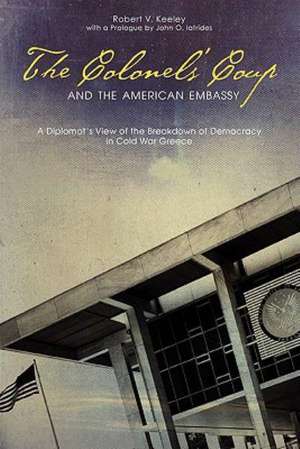The Colonels′ Coup and the American Embassy – A Diplomat′s View of the Breakdown of Democracy in Cold War Greece: ADST-DACOR Diplomats and Diplomacy Series
Autor Robert V. Keeley, John O. Iatridesen Limba Engleză Paperback – 14 apr 2016
Preț: 276.95 lei
Nou
Puncte Express: 415
Preț estimativ în valută:
52.99€ • 55.33$ • 43.76£
52.99€ • 55.33$ • 43.76£
Carte tipărită la comandă
Livrare economică 15-29 aprilie
Preluare comenzi: 021 569.72.76
Specificații
ISBN-13: 9780271050119
ISBN-10: 027105011X
Pagini: 304
Dimensiuni: 152 x 229 x 21 mm
Greutate: 0.45 kg
Editura: Penn State University
Seria ADST-DACOR Diplomats and Diplomacy Series
ISBN-10: 027105011X
Pagini: 304
Dimensiuni: 152 x 229 x 21 mm
Greutate: 0.45 kg
Editura: Penn State University
Seria ADST-DACOR Diplomats and Diplomacy Series
Notă biografică
Robert V. Keeley was a U.S. Foreign Service officer from 1956 to 1989. His last assignment was as the U.S. ambassador in Athens from 1985 to 1989. From 1990 to 1995, he was president of the Middle East Institute in Washington. Since 2005, he has been chairman of the Council for the National Interest Foundation, working for peace in the Middle East.
Cuprins
"Contents Preface Prologue by John O. Iatrides 1.Introduction with Dramatis Personae 2.Setting the Scene First Impressions The Political Situation The Phenomenon of Andreas Papandreou The Monarchy Trials and Negotiations An Alternative: U.S. Intervention? 3. The Author Gets Involved AndreasÆs March 1 Speech A Policy Assessment Preparing for Elections 4.The Days Before the Coup Presentiments and Alarums Washington Weighs In 5.The Coup The Coup of April 21, 1967 Assessing the Coup Coup Vignettes 6.Reacting to the Coup ôOur Present DilemmaOther Reactions Mac ThompsonÆs Attempt A Draft Telegram Mac and I Try Again 7.Dealing with the New Government A Call on Kollias A Postmortem A Visit by Nixon Shift of Focus 8.Andreas Papandreou and Prospects for Democracy Andreas in Danger Bits and Pieces Meeting Margaret Speculations 9.The Countercoup Planning the KingÆs Coup Crisis in Cyprus Checkmate of Constantine Aftermath of Failure 10.Assessing the ColonelsÆ Regime The FDR Fiasco Andreas Released ôDear Charleyö Harassment Continues The Meaning of Fascism 11.Friction at the Embassy Kay Leaves, I Continue Go Along to Get Along Parallels with Pakistan 12.Looking to the Future of Greece Assessment of Andreas The Papandreou Funeral Was Greece Ever a Democracy? DonÆt Make Waves 13.Final Thoughts Postscript AllÆs Well That Ends Well? Appendix A: Seferis and the Clinton Speech Appendix B: Internal Embassy Memoranda, MarchûJune 1968 Notes Index

























